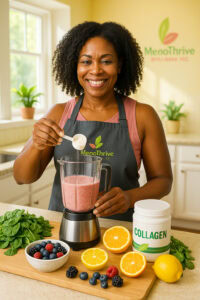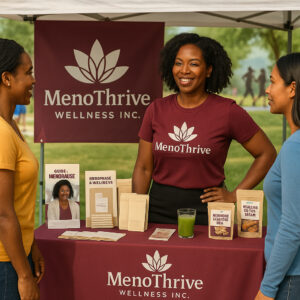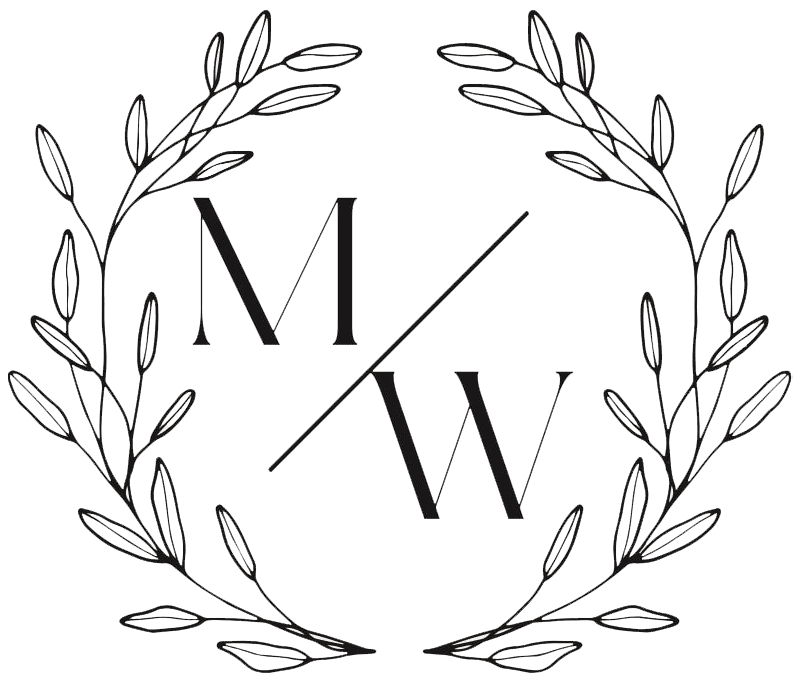
Collagen During Menopause: Does It Live Up to the Hype?
Collagen During Menopause has become a hot topic in health and wellness circles. From beauty powders to bone broth, collagen is everywhere—but does it really help women during midlife?
At MenoThrive Wellness, we’re diving deep into what collagen is, how menopause impacts its production, and why it matters, especially for Black and diverse women navigating hormonal transitions.
📌 Table of Contents
🧪 What Is Collagen and Why Does It Matter
Collagen During Menopause plays a vital role in maintaining your skin, joints, gut, and overall well-being. Collagen is the most abundant protein in your body, often called the “glue” that holds everything together.
It’s made of 19 amino acids that support:
-
Joint flexibility
-
Skin elasticity
-
Gut lining integrity
-
Tissue repair
But here’s the catch: collagen production declines after age 25 and sharply drops during perimenopause and postmenopause2.
For Black and diverse women, this decline may present differently, due to factors like chronic stress (weathering), inflammation, vitamin D deficiency, and specific skin physiology.

✨ The Benefits of Collagen During Menopause
Here’s why collagen during menopause can be a game-changer:
-
Boosts skin hydration and elasticity
-
Supports bone and joint health
-
Strengthens nails and reduces hair thinning
-
Enhances muscle tone and connective tissue repair
-
Promotes gut health and immune function
📖 A 2022 study in Nutrients confirmed that collagen peptides improved skin moisture and texture in midlife women3.
🥬 Best Collagen-Rich and Boosting Foods
Supplements are helpful, but food is foundational. Support your body’s natural collagen production with these whole foods:
| Food | Why It Helps | Easy Ways to Use |
|---|---|---|
| Bone broth | Rich in glycine, proline, and collagen | Sip warm, use in soups or grains |
| Spirulina | Plant-based amino acids | Add to smoothies or energy bites |
| Wild-caught fish | Omega-3s + collagen-friendly amino acids | Grill or bake with citrus |
| Eggs | High in proline and lysine | Pair with spinach or kale |
| Leafy greens | Packed with vitamin C for collagen synthesis | Add to stews or smoothies |
| Garlic & onions | Sulphur compounds aid collagen creation | Use as a base for savoury dishes |
| Pumpkin seeds | Zinc-rich for collagen support | Sprinkle on oatmeal or salads |
| Berries | Vitamin C and antioxidants | Add to breakfast or yogurt bowls |
| Citrus fruits | Vital for collagen creation | Add to teas, salads, or infused water |
| Gelatin | Collagen-derived, gut-soothing | Use in soups, wellness gummies |
Plant-based tip: While vegan collagen doesn’t exist naturally, a diet high in amino acids, vitamin C, and iron supports your body’s own collagen-building process.
Why Collagen Declines During Menopause
Hormonal shifts, particularly the drop in estrogen, affect how your body produces collagen5.
Symptoms of low collagen during menopause include:
-
Increased joint stiffness
-
Dull or sagging skin
-
Hair thinning or dryness
-
More frequent gut issues like bloating
Black women may also face unique challenges, such as:
-
Higher inflammation levels
-
Culturally specific stressors
-
Underrepresentation in skincare studies
That’s why understanding collagen during menopause is especially critical for long-term wellness and vibrancy.
💊 Choosing the Right Collagen Supplement
If you’re exploring supplementation, quality matters. Here’s what to look for:
✅ Hydrolyzed collagen peptides (for better absorption)
✅ Sourced from grass-fed or wild-caught animals
✅ No added sugars, fillers, or artificial flavours
✅ Third-party tested for purity
🔗 MenoThrive-Approved: Vital Proteins Collagen Peptides
💡 Tip: Add it to your tea, smoothie, or soup, it’s tasteless and blends easily.
💜 Final Thoughts from MenoThrive
Collagen during menopause isn’t just a beauty trend—it’s about nourishing your foundation.
Whether you choose food, supplements, or both, supporting collagen means supporting:
-
Your movement
-
Your glow
-
Your confidence
-
You’re thriving through menopause
At MenoThrive Wellness, we’re here to provide evidence-based, culturally relevant support for Black and diverse women navigating midlife health with power and purpose.
🔗 Visit our blog for more on nutrition and menopause
📬 Subscribe to our newsletter for hormone health tips and community resources.
References
[^1]: Cleveland Clinic. What Is Collagen? https://health.clevelandclinic.org/what-is-collagen
[^2]: Research Gate. Changes in collagen and elastic fibres during aging and menopause. https://www.researchgate.net/publication/320632233
[^3]: Nutrients Journal. Collagen Peptides Improve Skin Health. https://www.mdpi.com/2072-6643/11/12/3048
[^4]: Healthline. Bone Broth Benefits. https://www.healthline.com/nutrition/bone-broth
[^5]: The effect of menopause on the skin and other connective tissues https://academic.oup.com/jcem/article/90/3/1502/2836847


